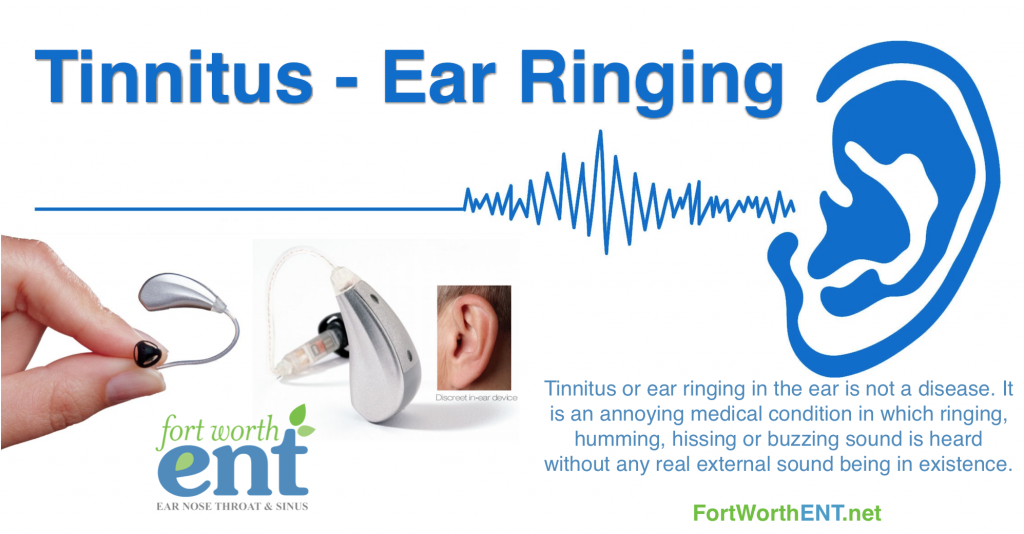Tinnitus and Hearing Loss
Tinnitus and hearing loss are often closely associated due to noise damage being a common underlying cause of both conditions. Tinnitus is the sensation of sound, perceived only by the person affected, without the presence of any external noise stimulation. Testing for audiology and hearing loss can be done with our audiologists at Fort Worth ENT.
Patients with tinnitus often describe the internal noise as:
- Ringing in the ears
- Humming or buzzing in the back of the head
- High frequency whistling
- Sizzling
- Pinging
- Cricket-like sounds
Tinnitus can become so bothersome and intolerable that the patient is unable to work, study, or concentrate.

While tinnitus does not cause a loss of hearing, many people who have hearing loss experience some form of tinnitus. Oftentimes, the type of tinnitus experienced correlates with the cause and degree of hearing loss. For example, tinnitus patients with noise or age-related hearing loss typically describe their tinnitus as a high-pitched constant sound. Those with hearing loss related to Ménière’s disease experienced tinnitus as a low humming sound.
Almost all patients who suffer from tinnitus also have some degree of hearing loss.
In a study conducted on workers who were exposed to and affected by occupational noise, patients who suffered from noise-induced hearing loss (NIHL) had a higher incidence of tinnitus, especially in proportion to auditory damage. As hearing loss increased, so did the degree and loudness of tinnitus experienced.
Causes of Tinnitus and Hearing Loss
Exposure to loud noise is the most common cause of tinnitus. Contributors to tinnitus can be:
- Loud music
- Explosions
- Continuous exposure to a noisy work environment
- Chainsaws and other loud work equipment
- Gun fire
- Extended use of amplified sound through headphones
- Fireworks
A single exposure to an extremely loud sound can result in tinnitus or hearing loss. If you are often in a noisy environment, using earplugs can protect your ears from being damaged. Over time, noises that may not seem to be especially bothersome can adversely affect the hair cells of the inner ear, making you more susceptible to both tinnitus and hearing loss.
Other causes of tinnitus can include:
- Natural aging process
- Joint dysfunction in the jaw (where it connects to the ear)
- Middle ear infections
- Head injury
- Compacted ear wax
- Stress
- Ototoxic drugs
- Ménière’s disease
- Auditory nerve tumors
- Perilymp fistula (inner ear hole)
Problems which commonly accompany tinnitus include:
- Hearing loss
- Difficulty sleeping
- Frustration, annoyance, or depression
- Hyperacusis (intolerance or hypersensitivity to normal sounds)
Tinnitus can occur occasionally, be a recurring problem, or be a constant condition. It can range from a quiet background noise to virtually unbearable, which makes treatment highly individualized.
Treating and Managing Tinnitus
Treating or managing tinnitus typically involves some type of sound therapy since, in most cases, tinnitus is not curable. Sound therapy involves using external noise to alter the patient’s perception of the intensity of their tinnitus.
Types of sound-based therapies include:
- Masking: Exposure to external noise which completely or partially covers the tinnitus sound
- Distraction: Use of external noise to divert attention from the tinnitus sound
- Acoustic neuromodulation: Specialized sound is used to lessen neural hyperactivity
- Habituation: Retraining the way the brain classifies tinnitus
Tinnitus Masking
The most common sound therapy for tinnitus is the masking technique. Tinnitus masking often utilizes an electronic device which generates and emits narrow or broad-band noise at a low level (white noise). Because most tinnitus sufferers also have hearing loss, the tinnitus maskers can be combined within a hearing aid and operate as one instrument. The sounds emitted into the ear cover up, or mask, the volume and intensity of tinnitus, thus acting as a distractor.
Sound machines can also be used for tinnitus masking. These machines, which are typically table-top devices, generate subtle, relaxing, ambient sound such as:
- White noise
- Pink noise (involves lower frequencies than white noise)
- Waterfalls or running water
- Crashing waves
- Rainforest sounds
- Storms
Medical-grade devices are also available which can be customized for the individual and his or her tinnitus treatment. Specific frequencies and/or tones can be pinpointed and emphasized that correlate with the type of tinnitus sound needing to be masked. Algorithmically-modified sounds and special notched music are utilized in this tinnitus sound therapy.
Sound machines are particularly helpful during sleep when patients do not want to wear a device and tinnitus symptoms can be more noticeable. Pillows equipped with built-in speakers are even available to provide neutral sound during sleep.
Some patients find that common household sounds, such as music, electric fans, and television, can provide adequate masking for their tinnitus. Tinnitus maskers usually provide relief only while listening to the sound and shortly afterward, which makes the hearing aid/masker combination beneficial.
For patients without significant hearing loss, wearing a tinnitus masking device which operates on a specific, individualized wavelength or frequency can effectively mask tinnitus noise completely.
Hearing Aid Use for Tinnitus
Hearing aids can often help patients with tinnitus since noise damage is a common cause for both hearing loss and tinnitus. Amplification of outside sound can increase neutral sound activity while reducing the brain’s sensitivity to certain noises. Because tinnitus often occurs in conjunction with hearing loss, some experts feel that the brain may be compensating for lack of sound by creating its own. By using hearing aids, the background noises available to the brain ultimately act as a masking device for tinnitus. Hearing aids can also be adjusted to maximize the benefit for tinnitus sufferers.
Results from a study conducted by the Better Hearing Institute found that, in tinnitus patients who used hearing aids:
- Over 25% reported moderate to substantial tinnitus reduction while wearing hearing aids.
- 2 out of 3 felt tinnitus relief most or all of the time with hearing aid use.
- 29% had tinnitus relief all the time during hearing aid use.
- Those participants who had hearing aids fitted by health professionals using a comprehensive fitting protocol were almost twice as likely to have tinnitus relief than those using a minimalist fitting protocol.
Getting Help for Your Tinnitus
Getting help for your tinnitus will involve a careful and thorough evaluation by a certified audiologist. The audiologists at Fort Worth ENT Hearing Aid Center can provide complete diagnostic testing to determine if hearing loss is a factor in your tinnitus. Often, a combination of treatments can be successful in treating tinnitus.
Your audiologist will determine if a hearing aid will benefit you and, if so, what type is most appropriate for your circumstances. The hearing evaluation conducted by your audiologist is an important tool in deciding if a tinnitus masker is a good option for you.
If you are experiencing symptoms of tinnitus, please contact our office for an evaluation to determine the cause of your discomfort and assist you in regaining the quality of life that you desire.
If you would like an appointment with one of our physicians at Fort Worth ENT & Sinus please complete an online appointment request or phone 817-332-8848.


